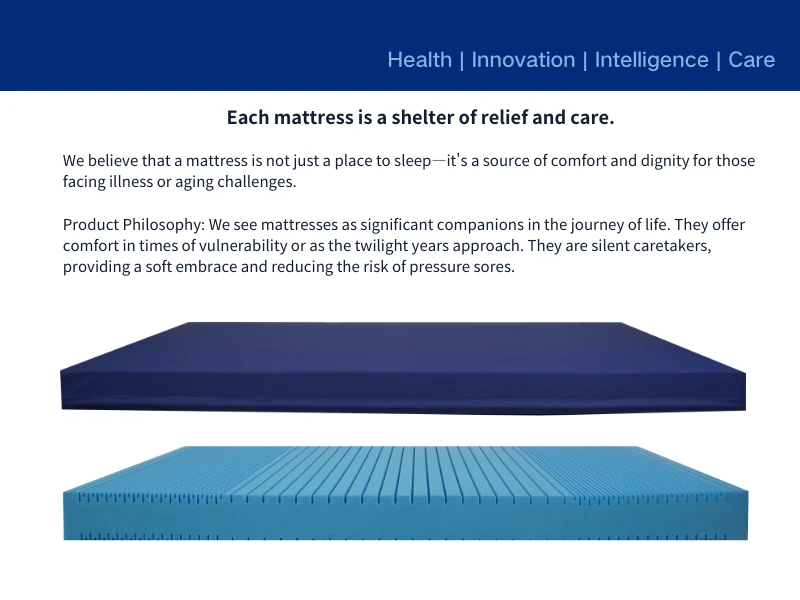Mattress Solutions for Effective Prevention of Bedsores and Pressure Ulcers
The Importance of Bedsore Prevention and the Role of Specialized Mattresses
Bedsore prevention is a critical aspect of healthcare, particularly for individuals with restricted mobility, such as the elderly or those recovering from surgery. These pressure ulcers, also known as bedsores or decubitus ulcers, occur when prolonged pressure on the skin restricts blood flow. This can lead to skin damage and, if untreated, may result in severe infections or complications. One effective way to mitigate the risk of developing pressure ulcers is through the use of specialized mattresses designed to redistribute pressure and enhance patient comfort.
Understanding Bedsore Formation
To comprehend the significance of bedsore prevention mattresses, it is crucial to understand how bedsores develop. When a person lies or sits in one position for an extended time, specific areas of the skin are subjected to constant pressure, especially over bony prominences such as the heels, hips, and elbows. This pressure can reduce blood flow, leading to tissue ischemia, which, if not relieved, culminates in cell death and the formation of ulcers.
Several factors contribute to the risk of developing bedsores, including friction, shear forces, moisture, and nutritional deficiencies. Vulnerable populations such as those with limited mobility due to injury, illness, or advanced age require vigilant care to prevent these painful and often debilitating sores.
The Role of Specialized Mattresses
To combat the threat of bedsores, mattress companies have developed a range of products aimed explicitly at pressure relief. These specialized mattresses are designed to adjust their shape and firmness in response to the weight and movements of the user, which helps in redistributing pressure away from vulnerable areas.
1. Air-Fluidized Mattresses These high-tech solutions utilize a bed of tiny beads or air pockets that conform to the body’s contours. The air under the patient reduces pressure points while promoting better circulation, making them an excellent choice for high-risk patients.
bedsore prevention mattress company

2. Alternating Pressure Mattresses These mattresses feature a system that alternates between inflated and deflated cells, which changes the pressure distribution across the body's surface. This mechanism effectively promotes blood flow and minimizes sustained pressure, significantly reducing the risk of sores.
3. Memory Foam Mattresses Memory foam conforms to the body’s shape, providing even weight distribution. While they may not have the advanced features of air-fluidized or alternating pressure mattresses, they offer a more cost-effective solution for many patients while still reducing pressure on bony areas.
4. Gel-Infused Mattresses These mattresses incorporate cooling gel to regulate body temperature, enhancing comfort for patients who may struggle with overheating. The gel's properties also provide a cushioning effect that can alleviate pressure points, contributing further to bedsore prevention.
Selecting the Right Mattress
When choosing a mattress for bedsore prevention, it is essential to assess the individual’s condition, mobility level, and specific needs. Consulting with healthcare providers can guide families and caregivers in selecting the most appropriate product. Factors such as ease of cleaning, durability, and patient comfort are also crucial considerations in the decision-making process.
Conclusion
Preventing bedsores is an essential part of patient care, particularly for those with limited mobility. Mattress companies play a pivotal role in this arena by providing innovative products designed to reduce pressure, enhance comfort, and improve overall patient outcomes. By investing in specialized mattresses, caregivers can significantly lower the risk of developing pressure ulcers, ensuring their loved ones or patients remain healthy, comfortable, and free from the pain and complications associated with bedsores. As technology advances, we can expect even more effective solutions to emerge, continually improving the quality of care for vulnerable populations.
-
The Effect of Coconut Foam Mattress Breathability and Humidity Regulation on Improving Sleep QualityNewsJul.03,2025
-
How Wave Mattress Systems Improve Blood Circulation During ImmobilityNewsJul.03,2025
-
The Climate-Adaptive Sleep Revolution: Exploring the Benefits of Cooling Gel Memory Foam MattressesNewsJul.03,2025
-
Exploration of the Role of Coconut Foam Mattress in Preventing Bedsores in the ElderlyNewsJul.03,2025
-
Comparing Wave Mattress and Air Mattress: Which Is Better for Medical Use?NewsJul.03,2025
-
Analysis of Comfort and Environmental Performance of Natural Latex and Coconut Foam MattressNewsJul.03,2025
-
Multi-Layer Construction for Enhanced Performance in Gel Mattress PadNewsJun.24,2025

